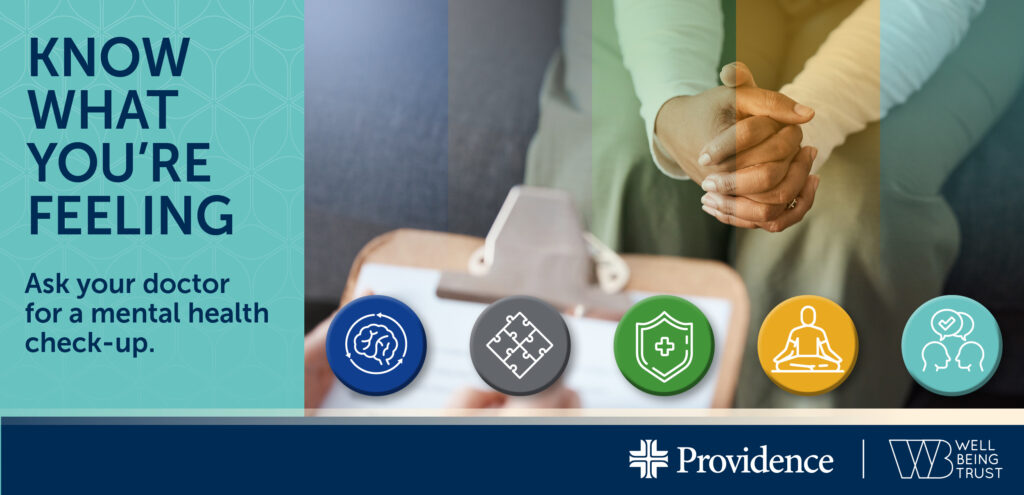Mental health struggles in America, and subsequent conversations around mental health, have sharply increased since the beginning of the pandemic. Millions of individuals are seeking care, and while some have received it, many continue to sit on therapy waitlists and utilize the emergency department due to limited access to local behavioral health services. These patients are in critical need of support, and mental health check-ups can be the catalyst for beginning their mental health healing.
Mental health check-ups are standardized questionnaires that capture the severity of disorders like anxiety, depression, substance use disorder and others. Typically administered by providers in clinic, the results can inform treatment or preventative care.
Earlier this year, for the first time, the U.S. Preventive Services Task Force recommended anxiety check-ups for individuals aged 65 and younger, and 2022 saw a record number of suicides according to the Centers for Disease Control and Prevention. With many Americans still needing care, check-ups are an avenue to begin that process. Here are 5 benefits of receiving a mental health check-up:
1. Check-ups can make you aware of what you’re experiencing
There are many symptoms for anxiety, depression and other disorders. It can be hard to delineate between symptoms, what they mean and what it means you have. Check-ups can cut through the confusion by providing a clearer picture of your mental health so you know your starting point.
2. Check-ups can inform your means of healing, and working toward that with your provider
Once you have an understanding of your current state, you’ll not only have a better awareness of your symptoms and care needs, but so will your provider. This is crucial for learning what means of coping and healing work best for you and your lifestyle. The treatment journey is different for everyone, even if many start in the same place.
3. Check-ups allow for early intervention in mental health care
It’s presumptuous to say getting a check-up automatically decreases chances of symptoms worsening and the onset of more severe conditions like suicidal ideation. That said, much in the same way that diseases like cancer is easier to treat when catching it early, mental health disorders are similar. Early intervention can play a key role in not letting symptoms snowball.
4. Check-ups can help you treat your physical and mental health simultaneously
Our physical and mental health are closely intertwined, and improving one can greatly influence the improvement of the other (for example, reducing stress and anxiety can help lower or prevent high blood pressure). Mental health check-ups can play an important role in whole-person care, which leads to better health outcomes and increased chances of longevity.
5. Check-ups can empower you in your mental health care
Receiving mental health care in the current day can be incredibly overwhelming. It’s hard knowing where to start, who to speak with and how to heal, making mental health care a mountain that feels impossible to climb. Check-ups alone aren’t a treatment catch-all, but they’re a necessary piece. Asking for and receiving a check-up can put the power in your hands during a time you feel powerless.
How you can ask for a mental health check-up during your next exam
If your provider or clinic doesn’t proactively offer mental health check-ups, we encourage you to ask your provider what ones they have available during your next exam. It can be difficult to know how to frame that question, especially if this is your first time learning about check-ups.
The good news is standardized check-ups already exist, and both are relatively brief. The PHQ-9 is the go-to for depression and GAD-7 is the same for anxiety. Both check-ups are 16 questions combined and take minutes to complete.
If you’re unsure the best way to ask for a mental health check-up, here are a few suggested questions for that conversation:
- “I recently learned there are standardized questions to check-up for anxiety and depression. Do you offer them, and can I have a check-up?”
- “I’m concerned I might have [disorder], do you offer any check-ups for this so we can confirm?”
- “I’d like to be proactive about my mental health. Do you offer any mental health check-ups so I can learn my status?”
If your provider does offer check-ups and you participate, ask them what resources or support they offer depending on your score. If your provider doesn’t offer check-ups, we encourage you to take this online version from Mental Health America, which also includes tests for eating disorders, postpartum depression, PTSD and other disorders. Depression and anxiety tests are available in Spanish as well.
If your doctor asks if you’d like to have a mental health check-up
With the increase in reported depression, anxiety and suicide rates, your provider might be thinking ahead and plan to ask you about your mental health and desire to have a check-up. If this happens, take advantage of the offer to get a check-up and lean on them for support and next steps. Ask them what materials are available to take home. Most importantly, don’t fear the results! Getting a check-up is important to know what you’re feeling so you can receive proper care.






